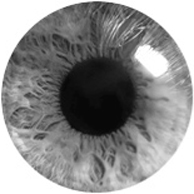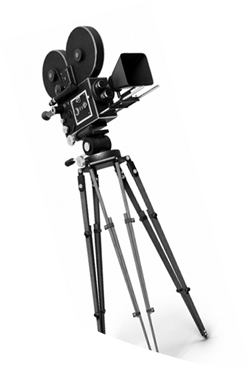Kino (11 page)
Authors: Jürgen Fauth

“They came to the hospital? What did they want?”
Dr. Hanno froze.
“They asked about you and the movie,” Sam said. “I think they're secret agents.”
“What?” Mina said. “Sam, you're delirious.”
“
Scheisse
,” Dr. Hanno said. “We have to go right now.”
“Listen Mina,” Sam said. “That Hanno guy is right. Get out of there now. I love you. Go.”
“What?” Mina said. “I love you, too.” But Sam had already hung up.
Mina looked out the window again just to see the men disappearing into the building. Someone had buzzed them in. Dr. Hanno took the phone from her hand and put it in its wall-mounted cradle.
“Frau Koblitz. They're coming for you.”
“Okay.” Mina took a breath and slipped into her brand-new parka. The irrational fear she'd felt at the airport was back. Whoever these men were, she didn't want to find out. “Where do we go?”

Dr. Hanno ushered her into the hallway, closed the door quietly behind him, and led them up two flights of stairs. They climbed quickly and quietly; they could hear footsteps coming up from below. They reached a latched metal door marked with a warning. Mina knew what “
Verboten
” meant. Dr. Hanno made eye contact, nodded, and pushed the door open. An alarm rang as they stepped onto a rooftop overlooking the city.
Dawn was coming up pink and sullen. The city was a jumble of construction sites, pre-war buildings with sloping roofs, modern apartments with roof gardens and swimming pools, and the odd landmark in the distance. The golf-ball-on-a-needle shape of the Fernsehturm loomed over the gold-green dome of the New Synagogue. Streets cut through at all angles, forming oddly-shaped blocks and yards. It would have been pretty if they weren't running from a bunch of creeps in suits.
“Quick,” Dr. Hanno said, carrying Mina's suitcase across two roofs to a metal ladder bolted to the side of a building. Mina looked over the edge: it went down all the way, six tall pre-war floors, to a cobblestone backyard.
“No way,” Mina said. “I'm not climbing down that thing.”
“Please,” Dr. Hanno said. “I'll take the suitcase.”
Over the ringing of the alarm, Mina could hear voices coming from the door they'd opened. A man in a dark suit emerged from the door, followed by two others.
“Come on,
schnell
!” Dr. Hanno disappeared over the edge, awkwardly holding Mina's suitcase between his body and the ladder.
The men were beefy and sported crew cuts. They spotted Mina and Dr. Hanno and began shouting Mina's name. One of them was waving what looked like an oversize manila envelope. When Mina didn't react, they started to run toward her, deftly navigating the rooftop with precise, athletic movements. “Mrs. Koblitz! Wait!”
Who were these men? Did Mina imagine seeing a curly wire in their ears, as if they were communicating with a mission control van waiting for them downstairs? Sam had called them secret agents. She glanced around the other rooftops, half-expecting to see snipers moving into position.
“Fuck,” Mina said. “Fuck, fuck, fuck.”
Whatever they wanted from her, it couldn't be good.
She swung her leg over the ledge.
Just focus on the ladder,
she told herself.
Don't look down.
This couldn't be worse than the time she went repelling in college. The ladder had held Dr. Hanno. She remembered something about a three-point ruleâonly move one limb at a time? She had no time for that. Rung by rung by rung, she descended, the metal cold against her fingers.
Don't look down, she reminded herself.
There was shouting above. They were closing in.
She had almost caught up with Dr. Hanno when she heard him give a strange sigh. She looked down and saw him let the suitcase slip. It teetered on his hip for a moment as if it were, perhaps, able to defy gravity and support itself, and then tumbled slowly downwards. It took a fearfully long time to hit the ground, and there wasn't much of a sound when it did. Just a dull thud. Mina could see her thingsâflippers, underwear, flowered sundressesâspill across the cobblestones below.
Suspended between the brightening Berlin sky and the approaching voices above and her honeymoon luggage and the sheepish face of Dr. Hanno below, Mina winced.
“You've got to be fucking kidding me.”
Chapter 9
Herr Dokter, you make a living out of the misery of others. The days here are deceptively mild like all California days, but at night, when the sedatives wear off, I hear the screams. I know I'm not alone in here. How many of us do you keep locked up? Don't you know there is no treatment for what ails us? If I was a car you'd stamp me
Totalschaden
and leave it at that. You're a junkyard attendant, warehousing wrecks. I showed people a better world. You're the warden of hell, and I am losing patience. I am trying to get to the point.
When I was led into Erich Pommer's office, my sweaty hands clutching the completed screenplay of
Tulpendiebe
, I had not slept, and I was pale, jittery. I had gone straight from Lang's apartment to the Belvedere, where Steffen's lover Ray kept an Adler typewriter in his study. I brewed coffee, snorted
Zement
, chewed cigarsâwhatever it took to turn the story I had spun at the party into a script.
Pommer shook my hand, took the pages from me, and barely looked at them. On his desk, I noticed the famous stack of silver coins he tossed to writers with good ideas. He motioned for me to sit. He wanted to know about my childhood in the Rheinland. He asked what kinds of movies I liked, and I told him Chaplin, Murnau, von Stroheim, Griffith, Dryer. He asked if my leg would be a problem on the set, and I told him that if Lang's dragon hadn't killed me, the director's chair certainly wouldn't. I wanted to tell him about my vision for
Tulpendiebe
but he cut me off with an axe chop of his hand that landed on a piece of paper he proceeded to push across the desk. It was a contract, already prepared. I flipped through the pages but didn't care what it said. It was a movie contract, and that was all I needed to know. I signed it “Kino.”
Later, I found out that Decla-Bioskop, Pommer's old company, had just been bought by Ufa and was being phased out as an independent entity.
Tulpendiebe
would be produced under their auspices. Pommer was worried about American predominance in the market and had signed off on some of the most expensive movies in Ufa's history. My historical romanceâthat's what he called itâwould be made on the cheap as a way of diversifying the risk from the mega productions the studio's fate was riding on. Pommer was hedging his bets, and
Tulpendiebe
could be written off if it failed. I committed to a tight budget and was given little control. I was to shoot my movie in four weeks in a Bioskop studio. The ship, the market, the Duke's palace, the tulip fields, even the windmillâeverything had to be created inside, on the cheap. We had to use the old Bioskop equipment, which worked with the outdated
Doppelnockenverfahren
. This meant my film couldn't be shown outside of Germany. But of course you wouldn't know the first thing about that, Herr Dokter.

The studio was a dump. Lang was in the Grosse Halle, making
Metropolis
, an even bigger production than
Die Nibelungen
, and Murnau was shooting
Faust
, another special-effects extravaganza, with Emil Jannings as Mephisto. Down the hall, Dr. Fanck was filming interiors for
The Holy Mountain.
I met Luis Trenker and Leni Riefenstahl, who shook her ass in my face. With
Metropolis
already ballooning out of control, nobody cared what we did.
To paint the backdrops, I hired Salvatore Luna, a Mexican painter known for his bold style, one of Steffen's friends. He's famous now, of course, for his extraordinary murals. Extras and costumes were difficult to come by because everybody was marching down the shafts of Lang's futuristic city. I had to fight for every clog and every pantaloonâthe costume department was working overtime on
Faust
. The contract also gave me no control over the casting. I didn't meet any of the actors until the first day of shooting. They were fourth-rate talents: Harald Flint, the Czech acrobat who played the sailor, liked to chew tobacco and spit at the painted backdrops. The Duke was an old lecher. My crew consisted of drunks, dropouts, and halfwits. My cinematographer was an alcoholic with shaky hands.
On the first day of shooting, I gave a rousing speech about cathedrals of light and unfettered potentialâbut none of them understood. I wanted magic, they wanted paychecks. They wanted to know what cathedrals had to do with tulips. I've never been comfortable with authority, and I found it distasteful to tell people what to do. I didn't want to be like my father, and I'd never direct like Lang, counting out gestures. I wanted to give the actors room, but they saw my openness as weakness, as permission to do as they pleased. I was too young to know what was required of me, and we fell three scenes behind on the first day.
I also found that during my time on
Die Nibelungen
, I had acquired something of a reputation. Everybody kept asking me for drugs, so Steffen and his ever-changing entourage began hanging around the edges of the studio, doling out Zement. Salvatore was addicted to a South American fungus powder that he claimed helped him hallucinate. Soon, half of the cast and crew were hooked, and the cocaine going around was cut with the stuff.
The early rushes were terrible. My worst problem was Sandra König, the mugging fourth-rate diva hired to play Lilly. She was the daughter of a financier Pommer owed a favor, and she was a disaster.
Tulpendiebe
needed an ethereal beauty, afflicted with a mysterious wasting disease, but instead, I had a ruddy-faced broad who couldn't even faint with grace. If the chaos on set didn't do me in, Sandra König was certain to ruin my movie.
Steffen told me not to worry. I am not proud of what happened next, but whatever Steffen's morals, he was a loyal, uncompromising friend. Without warning, Sandra König failed to show up on the set. A letter was discovered in her home that said that she had received a message from God and was leaving on a pilgrimage for the Holy Land. Four weeks later, she telegraphed from Damascusâshe had been found locked inside a shipping container filled with specialty foods destined for the Shah of Persia, drunk on Veuve-Cliquot. The last thing she remembered was having a nightcap with a handsome man.
Now I had a new problem on my hands: I had to replace the miserable Sandra König, and fast. Pommer threw a pathetic collection of headshots across his desk and told us to find someone by Monday or the production was finished.
If there was one thing Steffen was better at than anyone in the city, it was finding the right woman for a job, but by Sunday night, we were desperate. I needed someone who was haughty but also lovely, with an inherent wisdom and a vulnerable innocence. The only girl with a passable face was pregnant. Ute pushed her case relentlessly, but a Lilly with a prominent mole was impossible.
We tried the Romanisches, the Kranzler, Schwannecke, and the Jockey. We tried backstage at the Wintergarten, but the dancers either looked too cheap, too chipper, or too stupid to be Lilly. Steffen was exasperated with me. He had seen dozens of women who seemed fine to him. “Just pick one,” he kept telling me. We kept roving through streets, bars, and nightclubs, we even tried the opera and the debutantes at the Schauspielhaus, fruitlessly. My movie was about to be cancelled, but I wouldn't relent. There couldn't be
Tulpendiebe
without the perfect Lilly.
